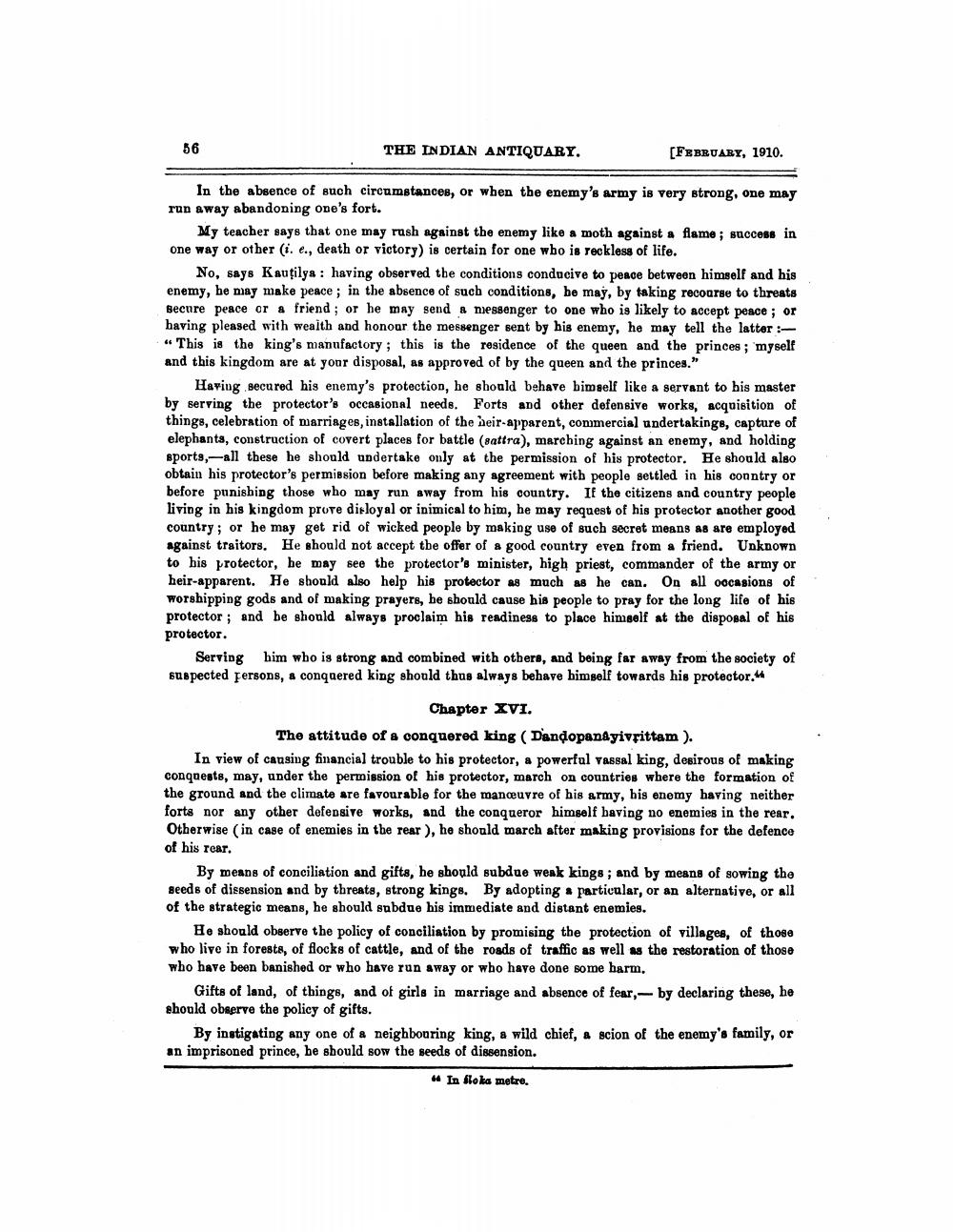________________
56
THE INDIAN ANTIQUARY.
[FEBRUARY, 1910.
In the absence of such circumstances, or when the enemy's army is very strong, one may run away abandoning one's fort.
My teacher says that one may rash against the enemy like a moth against a flame ; success in one way or other (i. e., death or victory) is certain for one who is reckless of life.
No, says Kautilya : having observed the conditions conducive to peace between himself and his enemy, he may make peace; in the absence of such conditions, be may, by taking recourse to threats Becure peace or a friend ; or he may send & messenger to one who is likely to accept peace; or having pleased with wealth and honour the messenger sent by his enemy, he may tell the latter :· This is the king's manufactory; this is the residence of the queen and the princes ; myself and this kingdom are at your disposal, as approved of by the queen and the princes."
Having secured his enemy's protection, he should behave bimself like a servant to his master by serving the protector's occasional needs. Forts and other defensive works, acquisition of things, celebration of marriages, installation of the deir apparent, commercial undertakings, capture of elephants, construction of covert places for battle (sattra), marching against an enemy, and holding sports, -all these he should undertake only at the permission of his protector. He should also obtain his protector's permission before making any agreement with people settled in his country or before punishing those who may run away from his country. If the citizens and country people living in his kingdom prove disloyal or inimical to him, he may request of his protector another good country; or he may get rid of wicked people by making use of such secret means as are employed against traitors. He should not accept the offer of a good country even from a friend. Unknown to his protector, he may see the protector's minister, high priest, commander of the army or heir-apparent. He should also help his protector as much as he can. On all occasions of worshipping gods and of making prayers, be should cause his people to pray for the long life of his protector ; and be should always proclaim his readiness to place himself at the disposal of his protector.
Serving him who is strong and combined with others, and being far away from the society of suspected persons, a conquered king should thus always behave himself towards his protector.
Chapter XVI. The attitude of a conquered king ( Dançopanayivrittam ). In view of causing financial trouble to his protector, a powerful vassal king, desirous of making conquests, may, under the permission of his protector, march on countries where the formation of the ground and the climate are favourable for the mancuvre of his army, his enemy having neither forts nor any other defensive works, and the conqueror himself baving no enemies in the rear. Otherwise (in case of enemies in the rear ), he should march after making provisions for the defence of his rear.
By means of conciliation and gifts, he should subdue weak kings; and by means of sowing the seeds of dissension and by threats, strong kings. By adopting a particular, or an alternative, or all of the strategic means, he should subdue his immediate and distant enemies.
He should observe the policy of conciliation by promising the protection of villages, of those who live in forests, of flocks of cattle, and of the roads of traffic as well as the restoration of those who have been banished or who have run away or who have done some harm.
Gifts of land, of things, and of girls in marriage and absence of fear, - by declaring these, he should observe the policy of gifts.
By instigating any one of a neighbouring king, a wild chief, a scion of the enemy's family, or an imprisoned prince, be should sow the seeds of dissension.
In floka metre.




